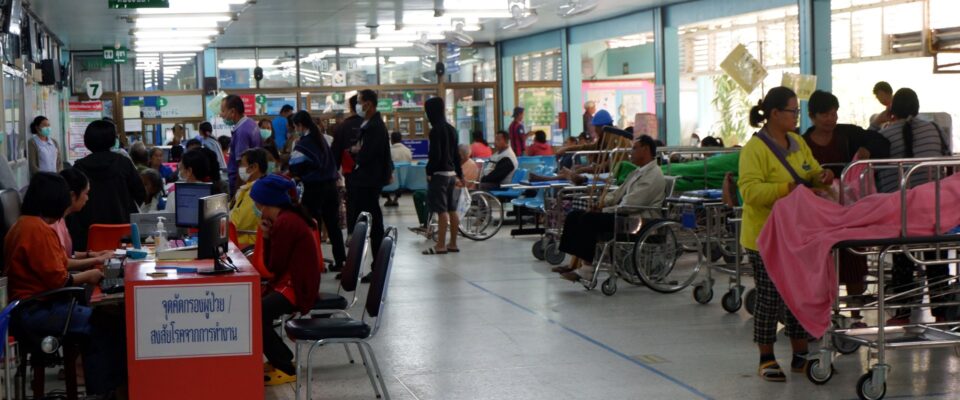Hundreds of doctors leave the public sector each year after enduring exorbitant workloads for paltry pay and no chance of advancement.
Given that there are only 24,469 doctors employed by the Public Health Ministry, the numbers of people leaving the public health system are significant. Over the previous ten years, some 450 doctors have retired annually and at least 150 others have departed the public sector.
Several well-known medical experts have recently spoken out about the slavery-like working circumstances that compelled them to leave their positions at state hospitals, including celebrity doctor Dr. Napasorn Weerayuttvilai.
Dr. Napasorn cited this as the reason she decided to step down: “I couldn’t see any light at the end of the tunnel.” After completing a night shift and checking on roughly 40 hospital patients on her morning round the next day, she prepared her resignation only to be admonished by her superior that she should have worked more quickly.
What challenges do interns encounter?
In her first year as an intern, Petchpailin Pongboriboon stated on Facebook, she was assigned to a state hospital in the Northeast with a beginning pay of 9,750 baht. In addition, she was given an after-hours eight-hour shift in the emergency room for which she was paid 900 Baht.
She recalls being summoned to a neurological case in the middle of the night once. She identified the patient’s need for a more experienced physician right away and requested that the hospital summon one. She was informed that the senior physician was occupied in an operation room. She investigated again after a significant amount of time had passed and found that the senior physician was working at a private hospital but had registered at the state hospital without reporting for duty.
Petchpailin discussed her experience with the heavy workload as well.
I have operated on seven appendices in a row in a single night.
She added that she once had to work 72 straight hours because a coworker missed a bus from Bangkok.
She describes how, during her year as an intern, she developed a coffee addiction since, without it, she felt she couldn’t keep up with her demanding schedule. She was consuming four to five cups of coffee each day by the time she finished her internship and met all the prerequisites for her medical education.
She gave a long number of reasons for leaving the state hospital, but her primary concern was that she would one day make a mistake treating a patient due to overwork and end up losing her job as a doctor.
Following stressful working conditions, Dr. Chutinart Chin-udomporn, a representative of the Thai Frontline Physician Union, likewise made the decision to leave the public sector.
“I used to put in 32 straight hours at the office. I hardly recognized my own name after periods like that, she recounted.
She added that other interns had endured worse conditions. Interns have complained to her union, claiming they were required to work 120 hours straight without a break.
The chair of the University Hospital Network, Assoc Prof Dr Surasak Leela-udomlipi, stated that such issues have long existed.
According to Surasak, who is also the director of Ramathibodi Hospital, “but they have become more obvious to the public because of growing workloads, the attitudes of new-generation doctors, and strong demand for medical professionals in the private sector and in foreign countries.”
He claimed that the universal healthcare program, which covers roughly 45 million of Thailand’s approximately 70 million inhabitants, was mostly to blame for the increased workload and worsening wellbeing.
According to Dr. Opart Karnkawingpong, permanent secretary of the Public Health Ministry, the country’s expanding geriatric population is also contributing to the increased workload because older individuals typically have more health concerns that need attention.
We also have to assume responsibility for offering drug addiction treatment programs, according to Opart.
“Decentralization has a hand in some work overloads at significant public hospitals. Patients swarm to larger hospitals because several subdistrict health promotion hospitals are unable to treat individuals in their communities. the reaction of authorities
A report by the Public Health Ministry from late last year revealed that 65 state hospitals had doctors working more than 40 hours per week. 18 of them reported having doctors who worked more than 46 hours a week, 11 reported having doctors who worked more than 52 hours, and nine reported having doctors who worked well above 64 hours a week.
currently that its doctors are currently less numerous than those who work in the private sector, the Public Health Ministry claims that it has put a plan in place to keep them. Higher compensation, improved welfare, opportunities for career progress, and sustainable workloads are the four main goals of the strategy.
To improve the mood of the medical staff, the ministry will work to hire additional doctors and provide career-advancement opportunities, deputy permanent secretary Dr. Taweesin Visanuyothin promised earlier this week.
In order to allow for more interns to be stationed at provincial hospitals, he added, “We also plan to change the residency training system.”
To help state hospitals, he added, there will be more medical students and interns.
Around 52% of Thailand’s 50,000+ doctors currently work for private hospitals or medical institutions. Government physicians currently make between 50,000 and 60,000 baht per month. Their typical income is only 100 to 200 baht per hour when their annual salary is divided by the number of hours they work. In the private sector, medical professionals typically earn substantially greater compensation. Medical professionals who open beauty clinics, a lucrative industry in Thailand, can anticipate monthly incomes of at least 200,000 baht.
Needs better dissemination and a more province-specific focus
The Human Resources for Health Research and Development Office’s Dr. Thinakorn Noree argued that doctors should be distributed more fairly around the nation.
As of 2021, there was one doctor for every 1,680 people in Thailand. This ratio, nevertheless, differs significantly between provinces, from 1:515 in Bangkok to 1:6,018 in Bueng Kan. The ratio should be close to one to one thousand according to World Health Organization guidelines.
Thinakorn stated that if more medical professionals are created in Thailand, they should be sent to regions where there are shortages.
He added that the Collaborative Project to Increase Production of Rural Doctors should receive greater government funding because its medical graduates have stayed longer in the regions. Interns are typically assigned to their home provinces as part of the rural doctors’ programme. Between 80% and 90% of people are retained.
“If you just focus on producing more doctors alone, that may not be the real solution,” he said. “We need to consider how to lessen workloads and the number of doctors quitting their jobs.”





